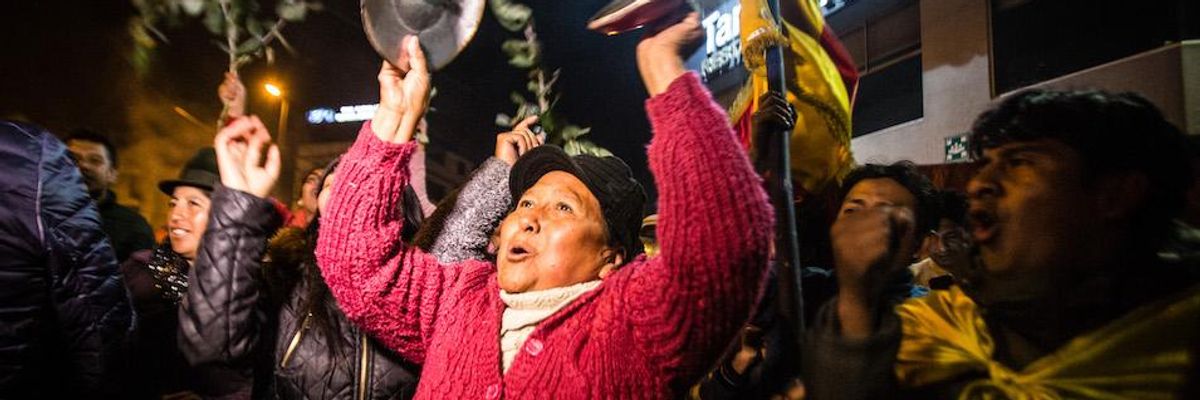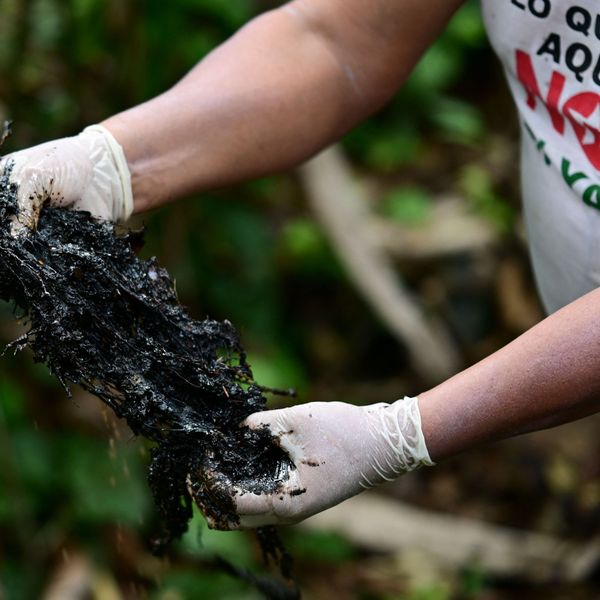
Celebration of the Ecuadorian Indians on 13 October 2019 in Quito, Ecuador, after Lenin Moreno issued the decree 883 on a national network. (Photo by Rafael Rodriguez/NurPhoto via Getty Images)
In Victory for People's Movement, Ecuador Protests End With Government Capitulation on Fuel Subsidies
"We want peace for our brothers and sisters in this country. We don't want more repression."
Indigenous groups in Ecuador celebrated Monday after news broke late Sunday that the country's leader, President Lenin Moreno, would make a deal with protestors that shut down the Latin American nation in nearly two weeks of demonstrations and scrap a controversial austerity package.
"I'm so happy I don't know what to say," said indigenous protester Rosa Matanago. "I don't have words, I'm so emotional. At least God touched the president's heart."
\u201cProtesters in Ecuador are celebrating after President Len\u00edn Moreno agreed to end a measure raising fuel prices that triggered nearly 2 weeks of violent mass protests\u201d— Bloomberg Quicktake (@Bloomberg Quicktake) 1571053209
Moreno signed directive 883, restoring the subsidies, on Sunday evening.
The protest movement in Ecuador began on October 2 after a coalition of indigenous groups, the Confederation of Indigenous Nations in Ecuador (CONAIE), launched demonstrations against the Moreno government's proposal to eliminate fuel subsidies in an effort to reduce the country's debt to the International Monetary Fund (IMF). Moreno also proposed slashing salaries for public workers as a way to generate funding to pay down the IMF debt.
As Common Dreams reported on October 8, the protests led to Moreno temporarily relocating his government outside of the capital, Quito.
The New York Times on Monday explained the dispute at the heart of the clashes:
Elimination of the popular subsidies was a keystone of the broad austerity plan required by the IMF in order to extend Ecuador a credit line. The loan was meant to bolster the country's economy, which has deteriorated in recent years because of lower oil prices and a strengthening dollar that has left the country's exports more expensive.
CONAIE president Jaime Vargas told The Guardian that the work is just beginning to negotiate a way forward for Ecuador but that he was heartened by what the protest movement--which reportedly left seven demonstrators dead and over 2,100 wounded or arrested--accomplished.
"We want peace for our brothers and sisters in this country," said Vargas. "We don't want more repression."
Video of the celebrations of indigenous protesters spread across social media Monday.
\u201cVIDEO: Indigenous protesters celebrate after the Ecuador government announces it has withdrawn an order that removed fuel subsidies that sparked two weeks of violent protests\u201d— AFP News Agency (@AFP News Agency) 1571056800
None— Elizabeth Ferrari (@Elizabeth Ferrari) 1571025285
\u201cEcuador's President Lenin Moreno agrees to swap a law that ended decades-old fuel subsidies for new legislation that will direct more resources to the needy https://t.co/38gOI2lVVZ\u201d— Reuters (@Reuters) 1571060400
Anti-war advocacy group CodePink urged caution from those celebrating the cessation in hostilities.
"This may be a victory for the indigenous people of Ecuador," the group tweeted, "but neoliberalism still reigns in the country."
An Urgent Message From Our Co-Founder
Dear Common Dreams reader, The U.S. is on a fast track to authoritarianism like nothing I've ever seen. Meanwhile, corporate news outlets are utterly capitulating to Trump, twisting their coverage to avoid drawing his ire while lining up to stuff cash in his pockets. That's why I believe that Common Dreams is doing the best and most consequential reporting that we've ever done. Our small but mighty team is a progressive reporting powerhouse, covering the news every day that the corporate media never will. Our mission has always been simple: To inform. To inspire. And to ignite change for the common good. Now here's the key piece that I want all our readers to understand: None of this would be possible without your financial support. That's not just some fundraising cliche. It's the absolute and literal truth. We don't accept corporate advertising and never will. We don't have a paywall because we don't think people should be blocked from critical news based on their ability to pay. Everything we do is funded by the donations of readers like you. Will you donate now to help power the nonprofit, independent reporting of Common Dreams? Thank you for being a vital member of our community. Together, we can keep independent journalism alive when it’s needed most. - Craig Brown, Co-founder |
Indigenous groups in Ecuador celebrated Monday after news broke late Sunday that the country's leader, President Lenin Moreno, would make a deal with protestors that shut down the Latin American nation in nearly two weeks of demonstrations and scrap a controversial austerity package.
"I'm so happy I don't know what to say," said indigenous protester Rosa Matanago. "I don't have words, I'm so emotional. At least God touched the president's heart."
\u201cProtesters in Ecuador are celebrating after President Len\u00edn Moreno agreed to end a measure raising fuel prices that triggered nearly 2 weeks of violent mass protests\u201d— Bloomberg Quicktake (@Bloomberg Quicktake) 1571053209
Moreno signed directive 883, restoring the subsidies, on Sunday evening.
The protest movement in Ecuador began on October 2 after a coalition of indigenous groups, the Confederation of Indigenous Nations in Ecuador (CONAIE), launched demonstrations against the Moreno government's proposal to eliminate fuel subsidies in an effort to reduce the country's debt to the International Monetary Fund (IMF). Moreno also proposed slashing salaries for public workers as a way to generate funding to pay down the IMF debt.
As Common Dreams reported on October 8, the protests led to Moreno temporarily relocating his government outside of the capital, Quito.
The New York Times on Monday explained the dispute at the heart of the clashes:
Elimination of the popular subsidies was a keystone of the broad austerity plan required by the IMF in order to extend Ecuador a credit line. The loan was meant to bolster the country's economy, which has deteriorated in recent years because of lower oil prices and a strengthening dollar that has left the country's exports more expensive.
CONAIE president Jaime Vargas told The Guardian that the work is just beginning to negotiate a way forward for Ecuador but that he was heartened by what the protest movement--which reportedly left seven demonstrators dead and over 2,100 wounded or arrested--accomplished.
"We want peace for our brothers and sisters in this country," said Vargas. "We don't want more repression."
Video of the celebrations of indigenous protesters spread across social media Monday.
\u201cVIDEO: Indigenous protesters celebrate after the Ecuador government announces it has withdrawn an order that removed fuel subsidies that sparked two weeks of violent protests\u201d— AFP News Agency (@AFP News Agency) 1571056800
None— Elizabeth Ferrari (@Elizabeth Ferrari) 1571025285
\u201cEcuador's President Lenin Moreno agrees to swap a law that ended decades-old fuel subsidies for new legislation that will direct more resources to the needy https://t.co/38gOI2lVVZ\u201d— Reuters (@Reuters) 1571060400
Anti-war advocacy group CodePink urged caution from those celebrating the cessation in hostilities.
"This may be a victory for the indigenous people of Ecuador," the group tweeted, "but neoliberalism still reigns in the country."
Indigenous groups in Ecuador celebrated Monday after news broke late Sunday that the country's leader, President Lenin Moreno, would make a deal with protestors that shut down the Latin American nation in nearly two weeks of demonstrations and scrap a controversial austerity package.
"I'm so happy I don't know what to say," said indigenous protester Rosa Matanago. "I don't have words, I'm so emotional. At least God touched the president's heart."
\u201cProtesters in Ecuador are celebrating after President Len\u00edn Moreno agreed to end a measure raising fuel prices that triggered nearly 2 weeks of violent mass protests\u201d— Bloomberg Quicktake (@Bloomberg Quicktake) 1571053209
Moreno signed directive 883, restoring the subsidies, on Sunday evening.
The protest movement in Ecuador began on October 2 after a coalition of indigenous groups, the Confederation of Indigenous Nations in Ecuador (CONAIE), launched demonstrations against the Moreno government's proposal to eliminate fuel subsidies in an effort to reduce the country's debt to the International Monetary Fund (IMF). Moreno also proposed slashing salaries for public workers as a way to generate funding to pay down the IMF debt.
As Common Dreams reported on October 8, the protests led to Moreno temporarily relocating his government outside of the capital, Quito.
The New York Times on Monday explained the dispute at the heart of the clashes:
Elimination of the popular subsidies was a keystone of the broad austerity plan required by the IMF in order to extend Ecuador a credit line. The loan was meant to bolster the country's economy, which has deteriorated in recent years because of lower oil prices and a strengthening dollar that has left the country's exports more expensive.
CONAIE president Jaime Vargas told The Guardian that the work is just beginning to negotiate a way forward for Ecuador but that he was heartened by what the protest movement--which reportedly left seven demonstrators dead and over 2,100 wounded or arrested--accomplished.
"We want peace for our brothers and sisters in this country," said Vargas. "We don't want more repression."
Video of the celebrations of indigenous protesters spread across social media Monday.
\u201cVIDEO: Indigenous protesters celebrate after the Ecuador government announces it has withdrawn an order that removed fuel subsidies that sparked two weeks of violent protests\u201d— AFP News Agency (@AFP News Agency) 1571056800
None— Elizabeth Ferrari (@Elizabeth Ferrari) 1571025285
\u201cEcuador's President Lenin Moreno agrees to swap a law that ended decades-old fuel subsidies for new legislation that will direct more resources to the needy https://t.co/38gOI2lVVZ\u201d— Reuters (@Reuters) 1571060400
Anti-war advocacy group CodePink urged caution from those celebrating the cessation in hostilities.
"This may be a victory for the indigenous people of Ecuador," the group tweeted, "but neoliberalism still reigns in the country."

